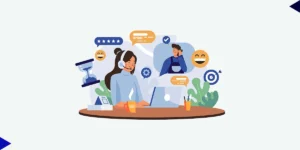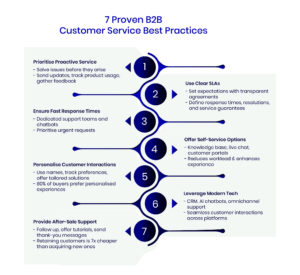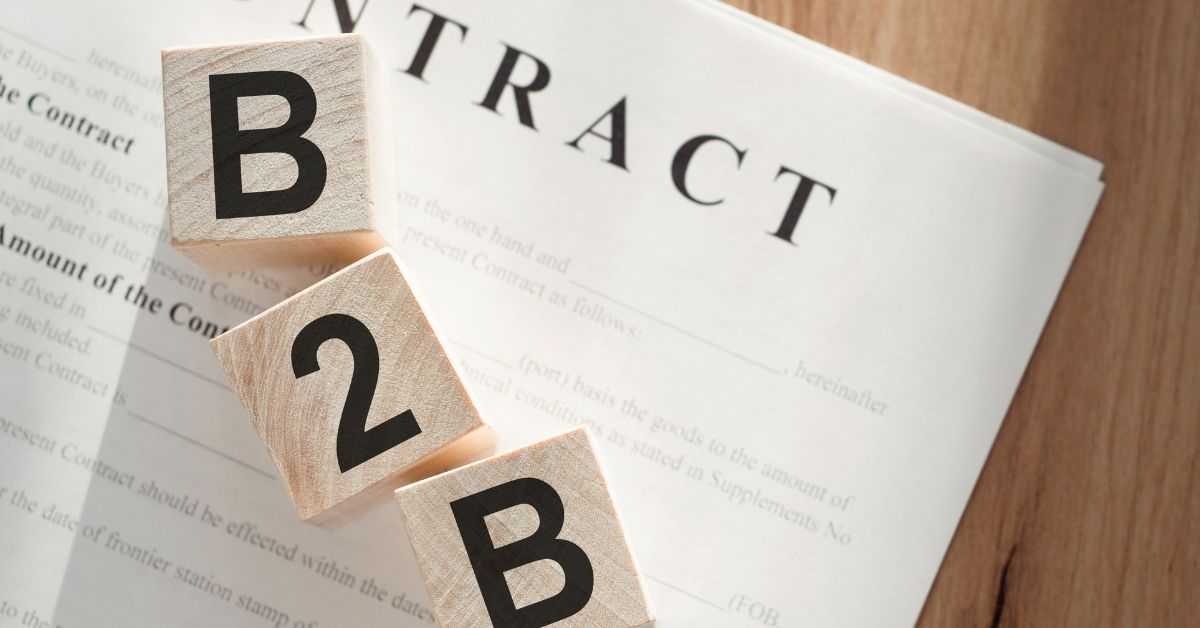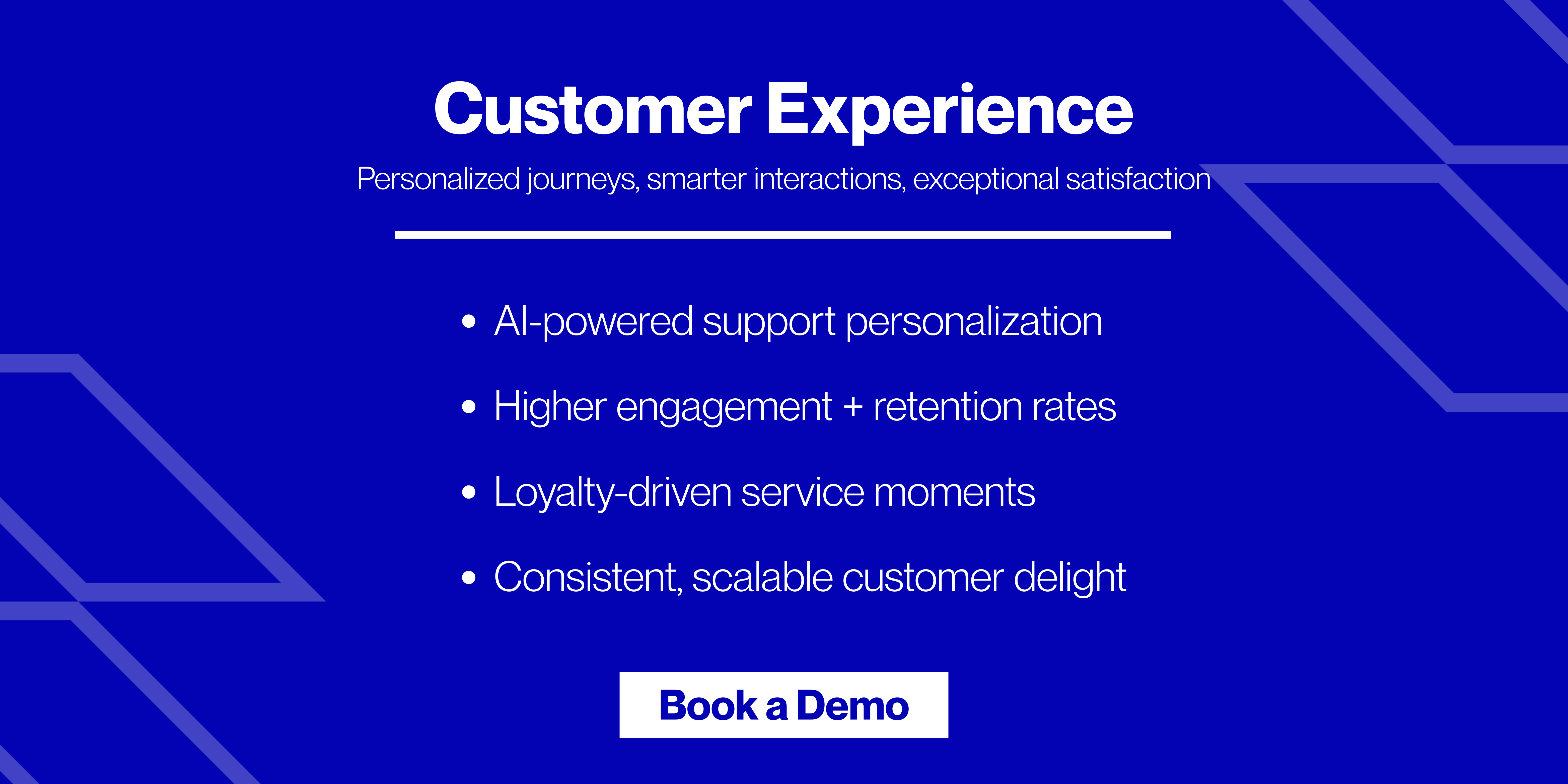Customer service in B2B is the support and assistance your business provides to other businesses that buy your products or services. Primarily, it is focused on building long-term relationships by understanding customer needs, solving problems, and offering reliable support.
It is a common industry myth that B2B (business-to-business) companies don’t care as much about customer service as B2C (business-to-consumer) companies. But that’s not true. According to a Deloitte study, more than 90% of CX leaders in industries such as retail and consumer goods believe customer service is a differentiator.
For B2B business owners like you, customer experience is even more important. That’s because you usually have fewer clients, and losing even one customer can have a big impact. Plus, B2B products and services are often expensive, complex, and require a lot of trust.
Therefore, to keep strong relationships with customers, B2B businesses need to provide excellent and hands-on customer service. For consumer brands and fast growing D2C companies in the US, UK & Australia, this can make difference between repeat business and churn.
In this article, we will help you understand what B2B customer service is, explore the latest best practices, and share real B2B customer service examples.
What is B2B Customer Service?

B2B customer service is about how businesses support and interact with other businesses, rather than individual customers. In B2B, the stakes are higher because the deals are also much bigger than in B2C businesses.
A good B2B customer service strategy is all about building and maintaining strong relationships with your business clients. This means:
- Understanding their unique needs
- Solving their problems
- Helping them achieve their goals
Please understand that it is not just about the product you sell. While the quality, functionality, and reliability of your product matter, customer experience (CX) also depends on how your team interacts with clients. From the sales process to ongoing support, every interaction matters.
And this isn’t just an opinion – research from Microsoft Dynamics found that 95% of customers say good B2B customer service is essential for loyalty. This proves that while a great product is important, the way you engage with customers is just as crucial for long-term success.
7 Proven B2B Customer Service Best Practices
As a B2B business leader, you can follow these seven practices to stand out from competitors:

1. Prioritise Proactive Customer Service
Being proactive means solving customer issues before they even arise. Instead of waiting for customers to reach out with problems, you should anticipate their needs in advance.
This can be done by using automated systems to:
- Send regular updates
- Track product usage and predict likely issues
- Gather customer feedback to improve services
When clients feel that their provider is one step ahead, it builds trust and strengthens the relationship.
2. Use Straightforward SLAs for Transparent B2B Relations
A Service Level Agreement (SLA) is a contract. It clearly defines what customers can expect from your service. For example,
- It might include guarantees like resolving 98% of issues on the first call or responding to inquiries within 24 hours.
Thus, SLAs set expectations and prevent misunderstandings. To be effective, SLAs should:
- Be easy to understand
- Have realistic goals
- Be regularly reviewed to keep them relevant.
By setting clear service standards, your B2B business can show commitment to quality. This leads to better customer satisfaction and loyalty.
3. Pay Attention to Fast Response Times
B2B businesses often handle large contracts. Here, delays in support can lead to lost revenue for clients. That’s why quick response times are critical.
To improve response times, you should:
- Have a dedicated support team
- Use chatbots
- Prioritize urgent requests
- Install automated reply systems for simple inquiries
In high growth consumer brands, slow responses can affect conversion and retention.
4. Expand B2B Self-Service for Modern Buyers
Today’s B2B buyers expect the same convenience as B2C shoppers. Many prefer to solve issues themselves rather than contact support. You should develop a self-service system, such as:
- A knowledge base
- Live chat
- Product catalogs
- Customer portals
These allow clients to find answers quickly, which not only improves customer experience but also reduces the workload on support teams.
5. Make Your B2B Customer Service Experience Personalised
Customers appreciate when businesses treat them as individuals rather than just another account. Personalization means:
- Using a client’s name
- Remembering their preferences
- Offering tailored solutions
For example, your support team could send customized product recommendations or allow clients to choose their preferred communication channel. McKinsey research shows that 78% of B2B buyers are more likely to purchase again when companies personalize their experiences.
6. Apply Modern Customer Service B2B Tech Solutions
To improve B2B customer service, you can use tools like:
- Customer Relationship Management (CRM) software
- AI-powered chatbots
- Automated email responses
- Omnichannel support
Atidiv specializes in delivering this kind of omnichannel CX support for consumer brands and D2C businesses. Our US, UK & Australian clients rely on us to reduce response times, boost CSAT, and scale efficiently.
7. Remember About After-Sale Support
Many B2B businesses focus on making the sale but forget to follow up afterward. That’s a mistake. Research shows it can cost up to 7x more to acquire a new customer than to retain an existing one.
After-sale support includes:
- Checking in with clients
- Offering tutorials or guides on product usage
- Providing recommendations based on past purchases
- Sending thank-you messages
For consumer brands with revenue above $5M, after-sale services not only reduces churn but also promote lifetime value and referrals.
Popular B2B Customer Service Examples

To improve customer service, most businesses use automation, AI, and smart technology. Let’s check out some of the most effective B2B examples:
- Automated FAQs with QuickSearch Bots – instantly resolving repetitive queries.
- Time-Based Automation for SLA Management – ensuring tickets never fall through.
- Custom Bots for Faster Ticket Handling – gathering key details before agents step in.
- Smart Intents to Route Tickets Automatically – categorizing issues for faster resolution.
Task Automation to Boost Agent Productivity – reducing burnout and improving efficiency.
Strong Support, Lasting Business Success! Choose Atidiv For Better CX.
By improving B2B customer service, you can build long-term client relationships. Best practices such as proactive support, clear SLAs, personalization, and AI-driven tools reduce response times and increase productivity.
If you’re a VP, Director or Senior Manager leading CX at a consumer brand or D2C company, Atidiv can help. Our three-step approach (Discover, Develop, Deliver) gives you high-quality support tailored to your business goals.
Partner with Atidiv today to transform your customer service operations and stay ahead of the competition!
FAQs About B2B Customer Service
1. How can I improve customer service B2B without increasing costs?
Many B2B businesses worry that better customer service means hiring more agents, which increases costs. The good news is that automation can help! You can use:
- AI chatbots to answer common questions instantly.
- Self-service portals with FAQs, guides, and troubleshooting steps.
- Automated ticketing systems to assign issues to the right team.
This reduces manual work and speeds up responses. Through automation, there is less need to hire agents, which saves costs.
2. What should I do if my support team is slow to respond?
Please note that fast response times are highly important in B2B. That’s because delays can cost clients money. To improve speed:
- Set up Service Level Agreements (SLAs) to define response deadlines.
- Use automated alerts to remind your team about pending tickets.
- Prioritise urgent issues and assign them automatically to the right specialists.
3. How do I make customer service more personalised?
B2B clients expect customised support because they invest heavily in your products/ services. To personalise their experience:
- Use CRM software to track client history and past purchases.
- Assign dedicated account managers for high-value clients.
- Communicate through their preferred channels (email, chat, phone, etc.).
This improves customer service B2B and makes customers feel valued.
4. How can I reduce the number of repetitive customer service queries?
If your team is answering the same questions over and over, you can do the following:
- Create a detailed knowledge base with FAQs, troubleshooting guides, and video tutorials.
- Use AI-powered search bots that instantly find answers for customers.
- Automate “ticket triaging” so that common queries get resolved automatically.
- Train customers on product usage through webinars or onboarding guides.
By letting customers find answers themselves, you can reduce the workload on your agents and improve customer service B2B.

